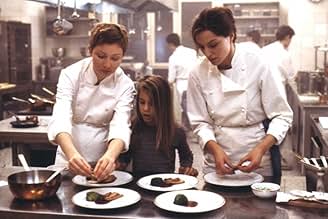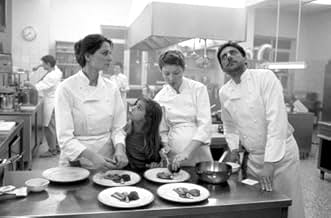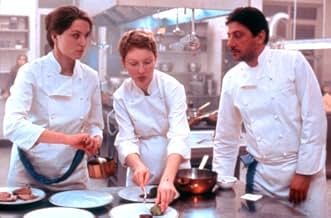VALUTAZIONE IMDb
7,2/10
8754
LA TUA VALUTAZIONE
Quando una chef testarda si prende cura della sua nipote di 8 anni altrettanto testarda, le tensioni tra loro aumentano - fino a quando un sous-chef italiano arriva per alleggerire l'atmosfe... Leggi tuttoQuando una chef testarda si prende cura della sua nipote di 8 anni altrettanto testarda, le tensioni tra loro aumentano - fino a quando un sous-chef italiano arriva per alleggerire l'atmosfera.Quando una chef testarda si prende cura della sua nipote di 8 anni altrettanto testarda, le tensioni tra loro aumentano - fino a quando un sous-chef italiano arriva per alleggerire l'atmosfera.
- Regia
- Sceneggiatura
- Star
- Premi
- 14 vittorie e 7 candidature totali
Wolf-Dietrich Sprenger
- Lauter Gast
- (as W.D. Sprenger)
Victoria Trauttmansdorff
- Begleiterin
- (as Victoria von Trautmannsdorf)
Jerome Ducornau
- Jean
- (as Jerome Ducournau)
Recensioni in evidenza
You have it now. Buy, don't rent this film. It's a keeper. Most notable and with great kudos to the director, the films stays true to itself almost all the way through. Far enough to beat out most other films. There are a few quibbles toward the end of the film, but not enough to shake off the aura it imparts just giving yourself over to its story.
The camera moves efficiently and cleanly throughout the film, and the actors respond with clean understated action and dialog.
The story is spare, and I found what I think is a clue to the writer's intention, as the protagonist describes the menu purpose of "Fish in Butter and Basil sauce." Listen for it and see if you don't agree, she is speaking to us about her story/film.
To own this is, like Nurse Betty, to own something you just have to pull out and watch a couple of times a year. just because they're so darn good.
No wonder the folks in H'wood are busy at making an American version for 2007.
The camera moves efficiently and cleanly throughout the film, and the actors respond with clean understated action and dialog.
The story is spare, and I found what I think is a clue to the writer's intention, as the protagonist describes the menu purpose of "Fish in Butter and Basil sauce." Listen for it and see if you don't agree, she is speaking to us about her story/film.
To own this is, like Nurse Betty, to own something you just have to pull out and watch a couple of times a year. just because they're so darn good.
No wonder the folks in H'wood are busy at making an American version for 2007.
A strange thing about the food: some of it, like the bird-cooked-in-pig's-bladder which Martha describes in loving detail in order to have something to talk about while she's with her therapist, sounds good, and perhaps even looks good, without being in the least bit appetising. You'd have to be mad to actually eat anything that's been cooked in a pig's bladder. But Martha is probably right aesthetically, if not in any other way: if she says the best way to cook the bird is in a pig's bladder, then you'd better believe it.
Martha is a superb creation. She's a good chef. (She may be the best chef of any film ever made.) When her boss sends her to a therapist, she talks about food and cooking, which interest her, rather than about herself, which doesn't interest her. She goes to therapy because her boss orders her to, and when her therapist (who's no fool either) asks her why she thinks her boss orders her to, she says, as though considering the question for the first time, that she doesn't know and she clearly doesn't care, either.
When various people (her orphaned niece, an Italian cook) come along to disrupt her life, we're on her side in wanting her to retain control; and although these likable people DO successfully disrupt her life, she does successfully retain control; so everyone wins. And it's hard not to admire someone who can not only insult the philistines who eat at the restaurant where she works but who know how to do so properly. These people don't know how good they have it. I'd rather be insulted by her than flattered by some spineless flunky.
The script, word for word, and moment for moment, is as perfectly judged as one of Martha's dishes. The IMDb user who says of Lina: "She didn't cry when her mother died, but she was really upset when Martha forgot to pick her up. It wasn't her fault, it was the script's" merely shows how much his sensibilities have been coarsened by Hollywood cliché. In fact, the film shows genuine insight into the way people naturally react, not the way lazy screenwriters would like to train them to react. Lina reacts to her mother's death not with the usual screen histrionics but by not eating. Tears are reserved (as they are in life) for less important misfortunes.
This is an assured, intelligent, charming film. Even the use of music shows an unerring touch. I'm eager to see what Sandra Nettelbeck does next.
Martha is a superb creation. She's a good chef. (She may be the best chef of any film ever made.) When her boss sends her to a therapist, she talks about food and cooking, which interest her, rather than about herself, which doesn't interest her. She goes to therapy because her boss orders her to, and when her therapist (who's no fool either) asks her why she thinks her boss orders her to, she says, as though considering the question for the first time, that she doesn't know and she clearly doesn't care, either.
When various people (her orphaned niece, an Italian cook) come along to disrupt her life, we're on her side in wanting her to retain control; and although these likable people DO successfully disrupt her life, she does successfully retain control; so everyone wins. And it's hard not to admire someone who can not only insult the philistines who eat at the restaurant where she works but who know how to do so properly. These people don't know how good they have it. I'd rather be insulted by her than flattered by some spineless flunky.
The script, word for word, and moment for moment, is as perfectly judged as one of Martha's dishes. The IMDb user who says of Lina: "She didn't cry when her mother died, but she was really upset when Martha forgot to pick her up. It wasn't her fault, it was the script's" merely shows how much his sensibilities have been coarsened by Hollywood cliché. In fact, the film shows genuine insight into the way people naturally react, not the way lazy screenwriters would like to train them to react. Lina reacts to her mother's death not with the usual screen histrionics but by not eating. Tears are reserved (as they are in life) for less important misfortunes.
This is an assured, intelligent, charming film. Even the use of music shows an unerring touch. I'm eager to see what Sandra Nettelbeck does next.
A few rhetorical questions:
a. Why are there no great English-language food/romance movies? Whenever you see a movie that truly ravishes you with food preparation and recipes as part of the atmosphere of the movie, it comes from France or Mexico or Hong Kong - or, if it is in English, it's borrowed culturally from another country (e.g. Chocolat, or the Mexican-American adaptation of Ang Lee's Eat Drink Man Woman). I think it's because the English speaking societies of the world have a relatively unsophisticated approach to food preparation and dining, manifest in our great contributions to world culinary arts - fast food and industrial agriculture, plus cooking technologies that take art out of the equation. You can't have a sexy drama set amidst a world of force-fed veal or microwave dinners.
b. Why do we never talk about German comedy? The Germans do have a comedic tradition, but the movies that are released in the US tend to be solemn dramas, violent or shocking action pieces or grim experimental works. On the rare instances that I see a German comedy, I'm always pleasantly surprised, and I have the feeling I'm missing out.
c. Why are European movies so much better than American films at showing sexiness and desirability in 30- or 40-something year-old women? I have a pet theory, that European sensibilities about marriage and commitment are sufficiently different from American norms that there is the expectation that a 35-year old woman may yet be actively and happily single, or perhaps a single mom who isn't stigmatized to feel that she had best find some sucker to marry her and get out of the dating pool.
d. Why isn't jazz used in American soundtracks anymore? In this film set in Germany, the score is assembled by Manfred Eicher (founder of ECM, the acclaimed modern-jazz label), and it's all good. Some nice German lieder, classic vocal jazz, and instrumental pieces by Keith Jarrett and others. We Americans appear to have forgotten jazz as soundtrack music.
In any case, Mostly Martha is a fine little movie set in contemporary Köln, starring Martina Gedeck as the title character. Martha is a neurotic, workaholic chef at a high-end restaurant, whose control freak tendencies keep her at a distance from everyone. When her boss insists that she go to therapy, she replies by preparing recipes for the hapless shrink. Both lonely and a loner (a tricky combination), she throws herself into her work to the point of exhaustion.
Martha's single-minded life is thrown upside down when she suddenly becomes the guardian to her niece Lina (Maxime Foerste). As she struggles to take on this new role, the arrival of a competitor in the form of a brash Italian chef (Sergio Castellitto) threatens her supremacy in the kitchen.
Any viewer of romantic comedies knows where this is going, but I have no complaints about the plot line. The performances were all good; the dialogue is thoughtful; the food looks delicious. It's not a great movie, but it's a good one and would be an admirable effort by any studio.
a. Why are there no great English-language food/romance movies? Whenever you see a movie that truly ravishes you with food preparation and recipes as part of the atmosphere of the movie, it comes from France or Mexico or Hong Kong - or, if it is in English, it's borrowed culturally from another country (e.g. Chocolat, or the Mexican-American adaptation of Ang Lee's Eat Drink Man Woman). I think it's because the English speaking societies of the world have a relatively unsophisticated approach to food preparation and dining, manifest in our great contributions to world culinary arts - fast food and industrial agriculture, plus cooking technologies that take art out of the equation. You can't have a sexy drama set amidst a world of force-fed veal or microwave dinners.
b. Why do we never talk about German comedy? The Germans do have a comedic tradition, but the movies that are released in the US tend to be solemn dramas, violent or shocking action pieces or grim experimental works. On the rare instances that I see a German comedy, I'm always pleasantly surprised, and I have the feeling I'm missing out.
c. Why are European movies so much better than American films at showing sexiness and desirability in 30- or 40-something year-old women? I have a pet theory, that European sensibilities about marriage and commitment are sufficiently different from American norms that there is the expectation that a 35-year old woman may yet be actively and happily single, or perhaps a single mom who isn't stigmatized to feel that she had best find some sucker to marry her and get out of the dating pool.
d. Why isn't jazz used in American soundtracks anymore? In this film set in Germany, the score is assembled by Manfred Eicher (founder of ECM, the acclaimed modern-jazz label), and it's all good. Some nice German lieder, classic vocal jazz, and instrumental pieces by Keith Jarrett and others. We Americans appear to have forgotten jazz as soundtrack music.
In any case, Mostly Martha is a fine little movie set in contemporary Köln, starring Martina Gedeck as the title character. Martha is a neurotic, workaholic chef at a high-end restaurant, whose control freak tendencies keep her at a distance from everyone. When her boss insists that she go to therapy, she replies by preparing recipes for the hapless shrink. Both lonely and a loner (a tricky combination), she throws herself into her work to the point of exhaustion.
Martha's single-minded life is thrown upside down when she suddenly becomes the guardian to her niece Lina (Maxime Foerste). As she struggles to take on this new role, the arrival of a competitor in the form of a brash Italian chef (Sergio Castellitto) threatens her supremacy in the kitchen.
Any viewer of romantic comedies knows where this is going, but I have no complaints about the plot line. The performances were all good; the dialogue is thoughtful; the food looks delicious. It's not a great movie, but it's a good one and would be an admirable effort by any studio.
Greetings again from the darkness. Nothing (well very few things) irritates me more than a marketing campaign that misrepresents the movie. The trailer I saw 2 months ago, led me to believe that this was a comedy, in fact, almost a slapstick comedy. PLEASE don't go to this movie expecting a comedy. There are a few laughs, but mostly just a few smiles and chuckles. This wonderful film offers so much other than comedy. Veteran German actress Martina Gedeck is just outstanding as Martha - a beautiful woman comfortable only while cooking ... and then just barely. Most of the movie deals with Martha's struggle at being a mom to her 8 year old niece AND having to share her kitchen with a talented "Italian" chef. Watching these 3 grow is painful, yet fulfilling. Watch for the changes in Martha's approach to food and life as Mario shows her the warmth and emotions of both. This is a coming of age film for an older woman. "My Big Fat Greek Wedding" had been my favorite little movie of the year. Now it is not so little, and "Mostly Martha" may be every bit as good. Just don't expect a laugh out loud comedy.
8=G=
"Mostly Martha" is a thoroughly delightful tale of a comely, self contained, socially unassured, and occasionally gauche German master chef, Martha (Gedeck), in need of a recipe for living who finds love through tragedy and romance through cooking. In thinking about these comments I concluded that there is nothing I would change about this film except the language (I don't speak German). A perfect little gem, "Mostly Martha" is the kind of flick which makes you feel sorry for those who won't watch foreign films because of subtitles and wonder why audiences dine voraciously on cinematic junk food when such palate pleasers as this are not only delicious but nutritious. (A-)
Lo sapevi?
- QuizSergio Castellitto's German wasn't good enough so Frank Glaubrecht was brought in to dub his voice for the German version.
- BlooperWhen Mario and Lina get ready to cook dinner at Martha's apartment, Lina puts on her apron twice.
- ConnessioniFeatured in Le cinéma passe à table (2005)
- Colonne sonoreCountry
Written by Keith Jarrett
Performed by Keith Jarrett, Jan Garbarek, Palle Danielsson, Jørn Christensen
ECM Records
I più visti
Accedi per valutare e creare un elenco di titoli salvati per ottenere consigli personalizzati
- How long is Mostly Martha?Powered by Alexa
Dettagli
Botteghino
- Lordo Stati Uniti e Canada
- 4.160.475 USD
- Fine settimana di apertura Stati Uniti e Canada
- 40.446 USD
- 18 ago 2002
- Lordo in tutto il mondo
- 9.852.022 USD
- Tempo di esecuzione
- 1h 49min(109 min)
- Colore
- Mix di suoni
- Proporzioni
- 1.85 : 1
Contribuisci a questa pagina
Suggerisci una modifica o aggiungi i contenuti mancanti

![Guarda Trailer [OV]](https://m.media-amazon.com/images/M/MV5BYmI4MTFiNjAtNzg5ZC00Mjg2LWFhNDYtMTVhYjYyMTM3ZGM5XkEyXkFqcGdeQXRyYW5zY29kZS13b3JrZmxvdw@@._V1_QL75_UX500_CR0)



























